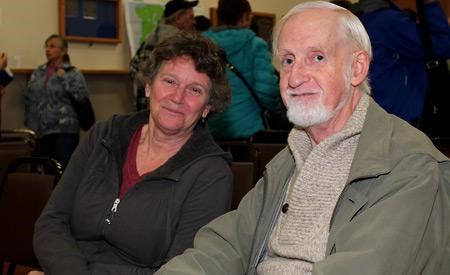A number of speakers raised concerns with Powell River Regional District’s draft official community plan (OCP) for Area C during a public hearing on January 30.
About 30 people attended the meeting, which was held at Lang Bay Community Hall. Colin Palmer, Area C director and board chair, along with Dave Murphy, Texada Island director, and Patrick Brabazon, Area A director, formed a panel for the hearing.
Rita Rasmussen, who has been involved in the review of the OCP since 2008, said many residents have voiced opposition to what is known as policy D5, which is in the existing OCP bylaw and stipulates existing land uses will be recognized in any future land use regulations. “We believe that the opportunity for a progressive OCP that would improve the community and correct the mistakes and negligence of the past has been wasted,” she said. “The use, pleasure and values of rural residential areas have been destroyed by an unfair decision that allows inappropriate industrial land use in designated rural residential areas to be brought forward again.” The land uses as defined in the 1989 OCP are valid, Rasmussen added.
A policy in the proposed new OCP states that all land uses existing at the time of adoption will be acknowledged through an appropriate land use designation. Future changes to land use that are not consistent with the OCP will not be protected.
David Moore, a resident of Area C for over 40 years, argued the policy is impossible to implement and has resulted in decades of land use conflict. He suggested Section 911 of the Local Government Act has a reasonable solution to the problem of non-conforming issues. It allows a window of opportunity to make changes where existing land uses are inappropriate, hazardous or not in the public interest.
As well, Moore pointed out that the definition of secondary suite includes a dwelling unit located within a single-family dwelling or other structure, with its own entrance. He pointed out that the rural residential policy allows one dwelling per lot up to two hectares in area, plus one dwelling for each additional two hectares of land. “A second separate detached dwelling on a two hectare site is an obvious contradiction and violation of the rural residential designation,” he said. “An attached secondary suite normally shares a plumbing and sewer system with the principle residence. The same cannot be said for detached dwelling units.”
Dan Glover, Vancouver Coastal Health’s drinking water officer for the Powell River region, told the Peak the public should be aware that the connection of two or more buildings to a water source creates a “water supply system” under the Drinking Water Protection Act. “This has implications as it requires the landowner to meet the requirements of the legislation including the provision of potable water, applying for a permit, ongoing sampling, and other actions as directed by a drinking water officer.”
Pat Christie, another speaker who has lived in the area for 25 years and who participated in the review of the OCP when it began in 2008, agreed with Moore’s concerns about the definition of secondary suites, which she said allows the proliferation of trailers in the area. She also said she didn’t think the plan was much different. “It felt as though the regional district was perpetuating the interests of individual land owners over the interests of the community as a whole or over the interests of the environment,” she said.
Another speaker disagreed with the riparian areas provisions that affect private property, while the final speaker raised concerns with the lack of a proper planning process for land uses.



